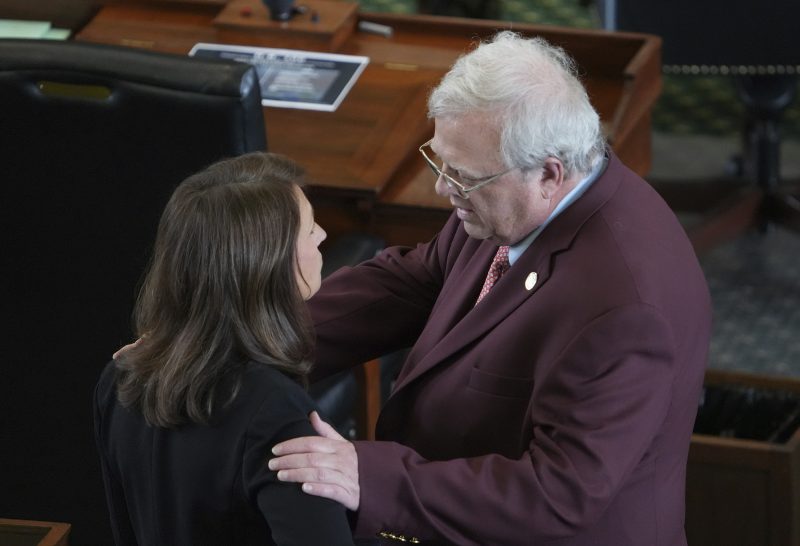Texas Republicans wound down their regular legislative session Sunday by changing election policies for a single populous Democratic stronghold but not other parts of the state.
The measure gives the secretary of state under certain conditions the power to run elections in Harris County, home to Houston and 4.8 million residents. It follows a bill approved days earlier that shifts the oversight of elections from its appointed elections administrator to the county clerk and county assessor.
Harris County officials at a news conference last week said they would bring a lawsuit challenging the measures as soon as Gov. Greg Abbott (R) signs them into law.
“These bills are not about election reform,” said Harris County Judge Lina Hidalgo, the county’s chief executive. “They’re not about improving voters’ experience. They are entirely about suppressing voters’ voices. The reasoning behind these bills is nothing but a cynical charade.”
Also over recent days, the Republican-controlled legislature passed bills increasing penalties for illegal voting and likely setting the stage for the state to withdraw from the Electronic Registration Information Center. The center was formed in 2012 to help states maintain accurate voter rolls, identify instances of potential fraud and contact people so they can register to vote. More than half the states belong to the consortium, but some Republican-run states have bolted from it over the last year as election deniers have spread false information about its work.
Critics are concerned about how the two bills affecting Harris County will interact with one another. One bill requires the county to change who oversees its elections starting Sept. 1, just weeks before Houston holds its election for mayor.
The quick transition could easily lead to problems, opponents of the measure say. If problems do occur, Secretary of State Jane Nelson could use the provisions of the other newly passed bill to oversee elections in Harris County. That would mean Nelson, a former state senator appointed as secretary of state by Abbott, would be in charge of the 2024 presidential election for the county.
And if Nelson did not believe that the new officials in charge of elections — Harris County Clerk Teneshia Hudspeth and County Assessor Ann Harris Bennett — had rectified problems, she could initiate legal proceedings to remove them from office under the legislation. Local officials said it would be unjust to allow the secretary of state the power to take action against two Black women but not those who hold equivalent positions in the state’s 253 other counties.
Under the bill, Nelson could oversee elections in Harris County if she found “good cause to believe that a recurring pattern of problems with election administration or voter registration exists in the county.” She would get to sign off on all of the county’s election procedures and could install members of her staff in Harris County offices.
“If the secretary’s office was motivated to the extent that they really wanted to be very involved directly in election administration, I think that this bill does provide that opportunity,” said Daniel Griffith, the senior policy director for Secure Democracy, a nonprofit group focused on expanding access to voting.
Republicans contended they needed to adjust how elections in Harris County are conducted because of past problems. In the March 2022 primary, the county didn’t have enough poll workers and failed to count about 10,000 mail ballots on Election Day. In the November 2022 general election, some polling places opened late and some ran out of ballots, which forced voters to wait for ballots to be restocked or go elsewhere.
State Sen. Paul Bettencourt (R), who wrote the bills focused on Harris County, called the November problems a form of voter suppression. Voters having to go to more than one polling site to cast a ballot “is utterly unacceptable by any measurement,” he said.
County officials have said they have learned from the errors and the latest legislation would cause new disruptions. Hidalgo said other counties in Texas faced issues but have received far less scrutiny.
Harris County is a bright blue spot in a red state. Donald Trump won Texas’ presidential election in 2020 by six points, even as he lost the county by 13 points to Joe Biden.
The county has been at the center of battles over voting for years. Amid the coronavirus pandemic in 2020, the county implemented overnight voting to accommodate shift workers and set up a drive-through voting program. Abbott and Republican lawmakers banned those practices a year later with sweeping legislation that also allowed partisan poll watchers to get closer to election officials and banned officials from sending unsolicited applications for absentee ballots.
Republicans this year again directed their attention to changing election laws. One bill approved Sunday changes illegal voting from a misdemeanor to a felony with a penalty of as much as 20 years in prison. Illegal voting had long been a felony in Texas but lawmakers changed it to a misdemeanor in 2021 as part of that year’s overarching elections legislation.
Illegal voting in Texas and elsewhere is rare. Opponents of the bill said having extremely stiff penalties could deter legitimate voters from casting ballots out of fear that they could inadvertently violate election rules and be punished.
A bill that passed on Saturday would allow members of the public to inspect ballots two months after any election. Those who examined ballots would not have access to information that would show whom individual voters voted for.
States have mixed policies on letting members of the public examine ballots, with some states treating them as confidential and others treating them as public records that anyone can review. Critics are worried the Texas legislation would allow members of the general public to handle ballots, running the risk they could add markings to them or otherwise damage them.
The Texas Constitution, like those in many states, bars the legislature from passing laws that apply only to specific jurisdictions. Harris County officials said they would use that provision of the state constitution to challenge the legislation targeting their county.
Whether they succeed will be up to the courts. The legislation does not mention Harris County by name. Instead, one bill is written to apply to counties of more than 3.5 million and the other to counties of more than 4 million. Harris County is the only county that meets those thresholds.
“We’re suing the state of Texas to protect Harris County, to protect Harris County residents, to protect our public officials and to stop the state from targeting us,” Harris County Attorney Christian Menefee said during last week’s news conference.
Historically in Texas, county clerks have overseen election administration and county assessors have overseen voter registration. The state allows counties to shift all those duties to a hired election administrator and about half the state’s counties have done so. Harris County adopted such a system after the 2020 election but will no longer be allowed to continue it under one of the bills headed to the governor.
The legislature failed to pass one bill that had alarmed Harris County officials that would have allowed the secretary of state to order a new election in the county if more than 2 percent of its polling places ran out of ballots for more than an hour. Critics called the legislation a recipe for a crisis that could have thrown the results of the next presidential election in doubt.








